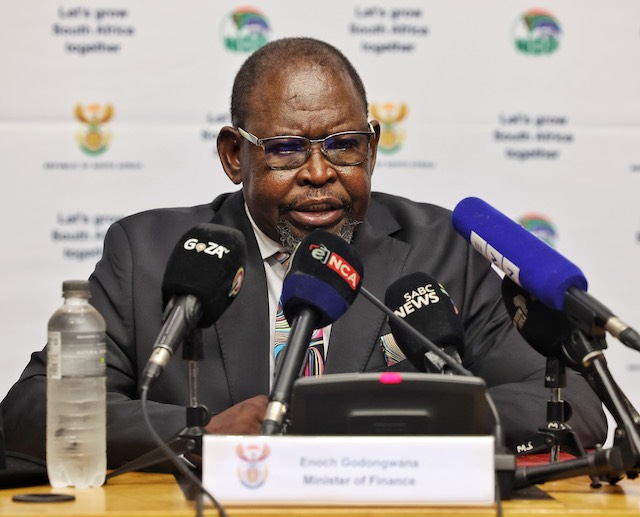Godongwana dangles R1tr of infrastructure projects: But companies must brace for changes in tender rules
Caption:
Finance Minister Enoch Godongwana announced R1
trillion infrastrcuture bonanza.
📷 NL-GRAPHICS DEPT
South Africa’s big money lenders and construction entrepreneurs must be licking their lips after Finance Minister Enoch Godongwana today tabled in Parliament a budget that shows that government plans to spend R1.03 trillion on infrastructure over the next three years.
This gigantic investment will keep road builders, dam constructors, civil engineers, electrical engineers, steel makers, and plumbers busy over the next three years as state-owned enterprises (SOEs) operating in the energy, transport and logistics, and water sectors roll out projects aimed at upgrading the country’s infrastructure.
“Infrastructure is a key pillar of our growth strategy. It is the bedrock for economic development, a key source of jobs, and an avenue to scale-up service delivery,” said Godongwana.

Caption: Finance Minister Enoch Godongwana
📷 GCIS
According to the Budget Review, one of eight budget documents tabled by Godongwana before Parliament, the SOEs such as Eskom, Transnet, Prasa, and Sanral will spend a lion’s share of the infrastructure budget, spending a total of R410.9 billion over the next three years.
A huge chunk of the budget will be spent on economic infrastructure, with roads receiving R402 billion, followed by energy with R219.2 billion, and water and sanitation R156.3 billion. Economic infrastructure will gobble up 81.5% of the budget as government attempts to eradicate infrastructure bottlenecks that make the economy inefficient and globally uncompetitive.
The most pressing bottlenecks are crumbling roads and railways which stifle transportation of goods and minerals from production hubs to markets, followed by unplanned power cuts and water shortages which negatively affect productivity of businesses.
The Budget Review also shows that social services infrastructure will also receive attention, with health and education getting big allocations of the investment, which is expected to make up 15.5% of the R1.03 trillion infrastructure spending.
To support this spending, the government said it was undertaking reforms to improve its infrastructure financing performance and was building a pipeline of blended finance projects, funded mainly through a combination of grants, debt, and equity.
One of the key reforms will result in the merger into a single entity of two units that are part of the Government Technical Advisory Centre with the Development Bank of Southern Africa’s Infrastructure Fund.
“Several reforms under way are designed to help the state deliver infrastructure and encourage private-sector investment. During 2025/26, a single structure overseen by the National Treasury will be established to coordinate state participation in project preparation and planning, public-private partnerships (PPPs), funding and credit guarantees,” says the Budget Review.
The announcement of the R1.03 trillion infrastructure spending comes at a time when government is expected to begin developing a new preferential procurement policy for government entities following the enactment of the Public Procurement Act (PPA) last year.
The eagerly-awaited policy will form part of PPA and will replace Preferential Procurement Policy Framework Act (PPPFA), the legislation that has been regulating government procurement for the last 25 years.
Once developed, the preferential procurement policy will usher in new tender scoring rules that companies bidding for government jobs will have to comply with. The Budget Review revealed that the development of the policy was yet to commence.
At the moment, state institutions such as SOEs, municipalities, and government departments adjudicate tenders in accordance with the PPPFA’s 2022 regulations, which came into effect on January 16 2023.
The 2022 regulations replaced the 2017 regulations which state institutions previously used to adjudicate tenders on the strength of bidders’ price competitiveness and BEE statuses or ratings.
Under the 2017 regulations, tenders valued below R50 million were awarded to bidders using the 80/20 preference points system, whereby 80 points were allocated for price competitiveness and 20 points for promoting BEE.
On the other hand, tenders worth more than R50 million were awarded using the 90/10 preference points system, whereby 90 points were allocated for price competitiveness and 10 points for advancing BEE. This meant that a bidder whose BEE status was level 1 was allocated the maximum 10 points for a tender above R50 million and 20 points for a tender below R50 million.
So, the implication of this tender scoring system was that if a bidder beat the prices of its rivals and had the same or higher BEE rating it was awarded the tender.
However, this tender scoring system ceased to be used when the 2022 regulations were introduced. The 2022 regulations give state institutions discretion to implement their own preferential procurement policies.
They have discretion to allocate the 10 or 20 preference points to promote specific goals that include awarding tenders to grow economically marginalised businesses owned by blacks, females or disabled people, or to promote small, medium and micro enterprises (SMMEs), as stipulated in the PPPFA.
Under the 2022 regulations, state institutions still allocate 80 and 90 points for price competitiveness for tenders valued less than R50 million and tenders above R50 million respectively.
The R1.03 trillion infrastructure spending will contribute in injecting pace into an economy that has been stagnant for more than a decade. The government forecasts that the economy will grow at an average of 1.8% over the next three years.
Government forecasts to generate R2.2 trillion in revenue in the fiscal year 2025/26, which will be lower than the projected spending of R2.6 trillion, implying it will record a budget deficit of nearly R400 billion, which is equivalent to 4.6 % of gross domestic product (GDP).
However, the budget deficit will narrow to 3.5% of GDP in the fiscal year 2027/28. The revenue shortfalls will be financed through debt. The government announced it will hike value added tax (VAT) by 0.5 percentage points this year and a further 0.5 percentage points next year to accommodate increases in government spending. The two hikes will increase VAT from 15% to 16%.
Although government has hiked the VAT, it is important to note that it is still running a budget deficit, which implies that the budget that Godongwana tabled is expansionary. In other words, the government is putting more money into the economy than it is taking out.


